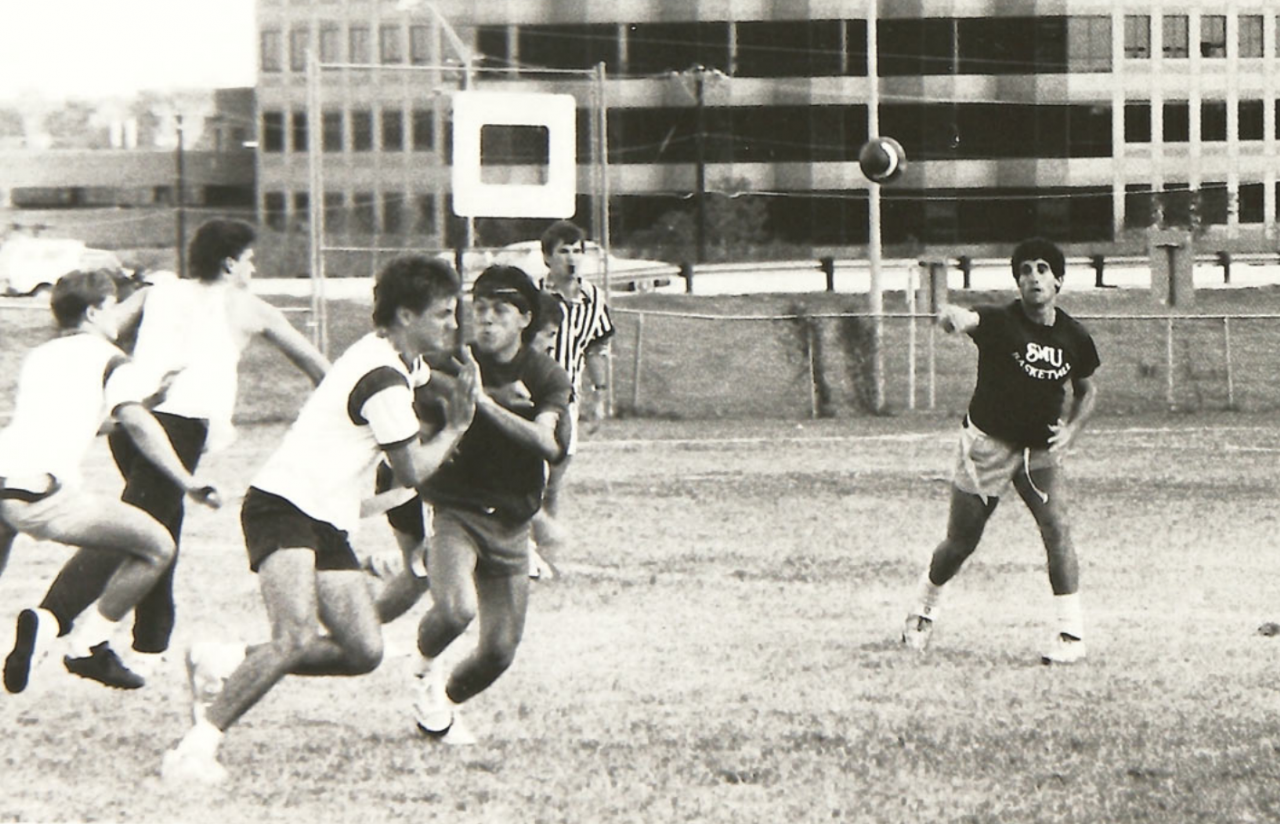Rick Singer, far right, throws the ball. File photo from Mirage 1986, p. 114.
“I think I can help kids. I like to communicate with people, and I’m definitely a person who works hard on my own skills.”
That was Rick Singer in a Trinitonian feature in 1985. Since graduating from Trinity, Singer has gone on to be the mastermind behind an admissions scam for which 50 people were indicted on March 12. The scam targeted elite schools, such as Harvard University and Yale University.
Singer was at the center of it all, bribing SAT administrators to alter students’ answers and coaches to help admit undeserving students with fake athletic profiles. But, while Singer’s Trinity connection was reported by multiple national and local news organizations, many at Trinity had never even heard of him.
“I’ve never heard of [Singer] prior to last week. To my knowledge, no one in our admissions office had heard of him either,” said Eric Maloof, vice president for enrollment management.
As admissions processes at schools across the country come under scrutiny, Maloof assured the integrity of Trinity’s Office of Admissions.
“In my 15 years at Trinity, nobody, not the president, no Board of Trustees member, has ever come to the admissions office and said, “You have to admit someone.” We have never had that happen in my 15 years at Trinity, and I’m incredibly proud of the institution for taking that approach,” Maloof said.
Singer bribed SAT administrators at a testing center in Houston, a city that is home to 25% of Trinity students. However, Maloof stressed that many of Singer’s clients were not necessarily from Houston.
“To my knowledge, no Trinity students have worked with Mr. Singer previously, but it’s also important to note that not every student Mr. Singer works with falsified their information,” Maloof said. “He ran a legitimate operation for some clients. There were obviously many clients that he worked with that were not legitimate, and that falsified information. I will also say it would be impossible and/or naive of me to say that nobody, past or present, at Trinity has worked with him. I don’t know that. I don’t know anybody that has, but it would be impossible or naive to say for certain, legitimate or illegitimate.”
Maloof predicted that the scandal would lead to a lot of reflection on admissions processes in schools across the country.
“I would say that each institution has to reflect on their own processes. I can’t speak for other places, but at Trinity, our comprehensive,and individual review of each applicant’s qualifications remains imperative in enrolling an academically talented and diverse class,” Maloof said.
The day after the news of the scandal broke, Maloof sent out a campus-wide email in which he clarified the values and vision of Trinity’s admission process. Maloof’s email stressed the holistic nature of the application review process.
“Grades, standardized test scores, essays, recommendations from school officials, rigor of the secondary school program and achievements outside of the classroom are among the many factors used to evaluate a student’s candidacy, but no one of these measures is considered determinative,” wrote Maloof, “While the academic record is the most important factor in the process, a strong co-curricular record might reflect a wide range of talents and achievements or distinguished accomplishment in just one or a few areas.”
According to Maloof, a student’s academic record — the course rigor and the grades that a student receives in high school — is the most important factor in determining a student’s admission, while test scores are a “distant second.”
Many of the students that Singer helped wrongly admit to selective schools came from wealthy families, which sparked a discourse on how much merit plays a role in college admissions. At Trinity, factors like special talents and the ability to pay may come into play in admissions decisions only for students who are “on the margins.”
“For the vast majority of students who are either admitted or denied at Trinity, it is based on other factors. On the margins, we do practice need-sensitivity, for students that are on the margins by our standards. That is one of many questions that we would take into account. We take into account, on the margins, for a small group of students, ability to pay. We take into account demonstrated interest. We take into account special talents. But no one of those things is solely determinative,” Maloof said.
Maloof explained why an applicant’s socioeconomic background can sometimes be a factor in their admission.
“Our first commitment is to admit highly academically gifted students, and we are really fortunate to have an endowment of 1.3 billion dollars and donors that make this possible,” Maloof said. “However, the full cost of delivering a Trinity education cannot be borne by the endowment or annual revenues alone. Student revenues provides 55 percent of our operating budget. That is why having students from all socioeconomic backgrounds is critical to us.”
Singer also helped to falsify athletic records for unqualified students in order to aid their admittance to elite schools, bribing coaches to claim that the student is one of their top recruits. At Trinity, the Department of Athletics cannot receive a promise of guaranteed admission from the Office of Admissions.
“A recommendation from the Department of Athletics to the Office of Admissions does not ‘reserve a spot’ for an applicant. All admitted student athletes must demonstrate at a very high level their ability to do Trinity-level work and positively impact our community –– and the Office of Admissions makes the final judgement on all admission decisions,” wrote Bob King, director of Athletics, in an email interview.
King’s department and the Office of Admissions will review their process.
“I do not see this recent scandal as affecting our process aside from partnering with the Office of Admissions to continue reviewing our processes and protocols to insure that we can continue to confidently stand behind the integrity of our admissions process for student athletes,” King wrote.
Singer’s status as a Trinity alum is not something that Maloof sees impacting the university in the future.
“I don’t think that [Singer being an alum] affects us. It’s obviously unfortunate. I don’t see that affecting us because it’s not a reflection of who we are or our current admissions practices and protocols, it has no bearing on that, so I don’t see that,” Maloof said. “I think the fallout of this has to do more with highly selective admissions and the process for students across the United States, rather than what school Mr. Singer went to.”
Correction: The photo originally published with this story was incorrectly labeled as Rick Singer. The photo has since been updated.













Jill Grace • Mar 22, 2019 at 1:40 pm
Why on earth did you use a picture of someone else for this story?? It’s borderline slander.